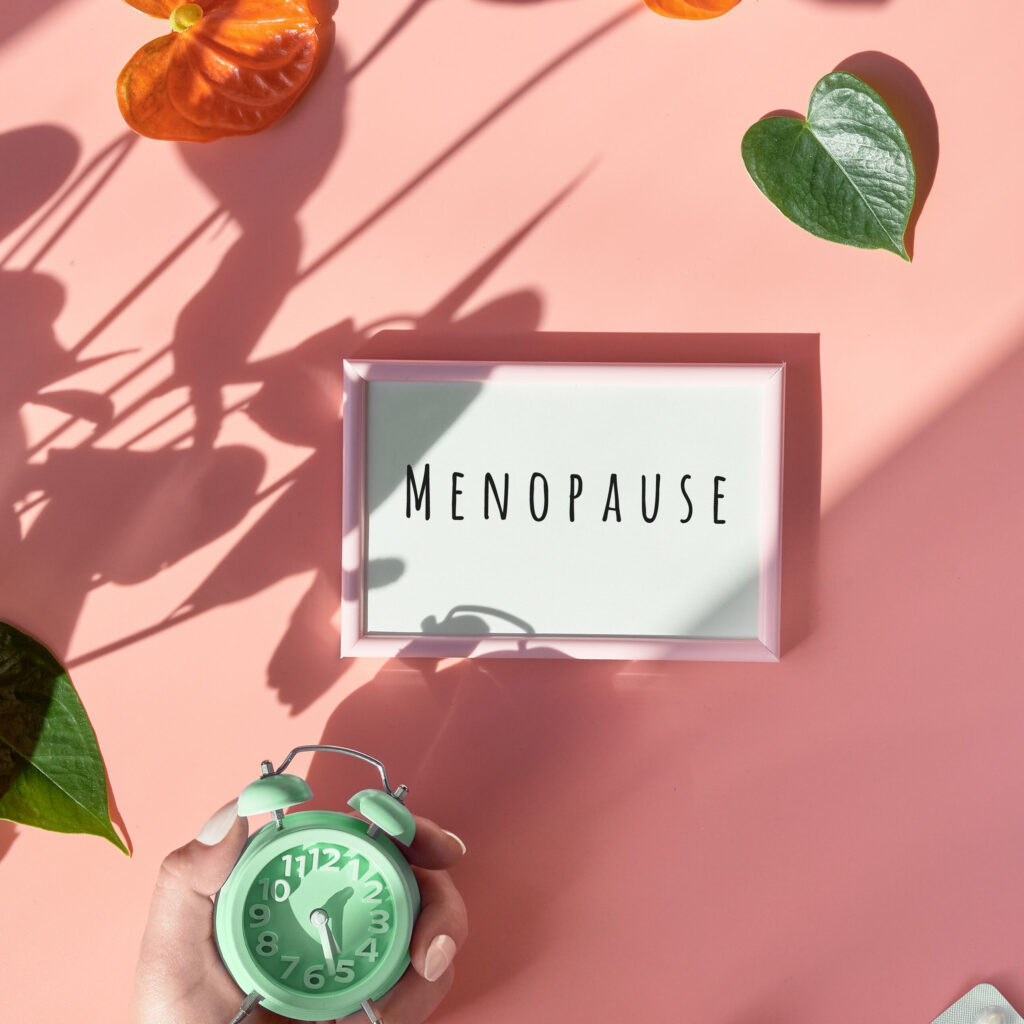The Natural Approach To Menopause Relief
Adopt a well-balanced diet, eating regularly and reducing stimulants like sugar and caffeine
Add phytoestrogens to your diet in fermented soya, flaxseeds and pulses
Think about your bone health
Consider healthy aging including heart health and breast cancer risk
Certain supplements and particularly herbs may be very useful in reducing symptoms
What Is The Menopause?
Each woman has a supply of eggs (approximately 2 million) from the moment she is born and over the years they are used up and die off. She finally reaches a certain age when there simply aren’t any more. The body then tries to get that woman to ovulate by releasing the hormone FSH. This hormone is released every month in a normal cycle but during the menopause, a woman’s body has registered that ovulation is not taking place, so even more FSH is pumped out.
The interesting thing is that as the ovaries decline their production of oestrogen, you are also able to produce a form of oestrogen (called oestrone) from your adrenal glands in order to compensate for the decline from the ovaries.
You also produce oestrogen from fat cells, so being ultra-slim will not have health benefits in the long run, particularly if you are going through the menopause. Overweight isn’t the answer either, but from an oestrogen-production point of view, you are better off being slightly overweight than too slim.
What Are The Symptoms Of Menopause?
Symptonms vary from woman to woman. Some sail though menopause without any symptoms, only noticing that their periods have stopped. Some of the women who visit our clinic report being completely drenched in sweat, day and night, and having to change their night clothes two or three times, even taking a shower in the middle of the night.
Symptoms of menopause can include:
- hot flushes
- night sweats
- vaginal dryness
- mood swings
- declining libido
- osteoporosis
- ageing skin
- lack of energy
- joint pains
- weight gain
- headaches
- changes in hair quality.
Interestingly, men also experience a lot of these symptoms, including irritability, a declining libido, changes in weight, ageing skin and hair, depression and anxiety. These symptoms are apparently part of the Western ageing process for both men and women, so it is important not to blame every symptom experienced on menopause.
Can Nutrition Help?
Your diet at this time can significantly affect the severity of your symptoms. We have excellent success with patients in our clinic suffering from menopause – we just wish that more people knew they didn’t have to put up with these symptoms.
Hot flushes and night sweats are among the most common and uncomfortable symptoms and their frequency and severity can vary from woman to woman. Certain foods and situations can trigger some hot flushes and these can include spicy foods, caffeinated drinks, alcohol and stressful situations.
Phytoestrogens can help alleviate menopausal symptoms so make sure you include plenty in your diet. Phytoestrogens are found in almost all fruit, vegetables and wholegrains but they are most beneficial when they are found in legumes, such as soya, lentil, peas and chickpeas.
Ideally all women would begin preparing for the menopause before it starts by adopting a healthy diet and lifestyle to help ease into the change. Eating a diet low in sugar and stimulants like caffeine may help reduce symptoms such as hot flushes and sweats, often brought on by stress. Supplements and herbs can be very beneficial in the short term until your hormones are balanced.
Nutrients
As well as eating a healthy diet, supplementation is beneficial during menopause not only to ensure adequate nutrients for maintaining healthy bones, but many can also help with menopausal symptoms.
A good quality multivitamin and mineral, specifically designed for menopause, should form the foundation of the supplement programme. This supplement should contain vital nutrients for bone health, good levels of antioxidants to help slow down the ageing process, and other important vitamins and minerals, such as the B vitamins and chromium, to help keep blood-sugar levels balanced. It should also contain calcium, magnesium, manganese, boron and vitamin D for good bone health.
Vitamin C helps to build up collagen which gives skin its elasticity and it is therefore helpful in the prevention and treatment of vaginal dryness (which can cause discomfort when the vagina loses some of its ‘stretch’). It can also help retain the elasticity in the urinary tract and so prevent leakage or stress incontinence, which is common at the menopause. Collagen is also important for your bones.
Also take a good Omega 3 Supplement as deficiencies can look like menopausal symptoms such as dry skin, lifeless hair, cracked nails, fatigue, depression, dry eyes, lack of motivation, aching joints, difficulty in losing weight and forgetfulness.
The risk of osteoporosis increases with age especially after the menopause when oestrogen levels decline.
The most important nutrients for your bones are without doubt calcium, magnesium and vitamin D.
Magnesium is also known as ‘nature’s tranquilliser’, so it will help with symptoms such as anxiety, irritability and other mood changes. The best source of magnesium is nuts and seeds but also wholegrains, pulses and leafy green vegetables.
We also need calcium for healthy heart rhythm, blood pressure, normal blood clotting, muscle contraction and relaxation and proper functioning of the nervous system.
We know that Vitamin D is required for calcium absorption, but it also plays many other important roles including prevention of cancer, especially breast cancer, heart disease, Type 2 diabetes and osteoporosis. As well as all of these benefits, it is now thought that having good levels of vitamin D can help slow down the ageing process and low levels have been implicated in autoimmune diseases such as rheumatoid arthritis, lupus and inflammatory bowel disease.
Herbs
There are a number of herbs that have traditionally been used at the menopause.
These include black cohosh which was originally used by Native North Americans and is very effective in helping with hormonal imbalances. It has a generally calming effect on the nervous system and as well as the hot flushes and night sweats and can be helpful with other symptoms include anxiety, tension and depression.
Agnus Castus (Vitex/ Chasteberry) is classed as an adaptogen as it has a balancing effect on your hormones. This is particularly helpful in the perimenopause years because your hormones can be fluctuating widely and this herb helps to create a level of stability. It is also the best herb to take if you are getting mood swings, anxiety and tension. Other useful herbs at the menopause include dong quai, sage and milk thistle.
We can help you know which are the best herbs for your symptoms.
Please note that herbs should not be used when taking hormonal medications including HRT. Many other medications are also contraindicated.
Tests for Menopause
A Hormonal Test (urine) can identify hormonal imbalances whether you are peri or post menopause. This test will also look at how you are metabolising (breaking down) your hormones which is important in breast cancer prevention and also look at whether stress is a big feature for you in hormonal health.
Do you want to know more about exactly what vitamins and minerals you need? Our Nutritional Profile MGL4 (blood) can help you to find out what you are deficient in so that you can restore yourself to balance.
Thyroid Tests can help to identify whether your thyroid is functioning optimally and we carry out a wide number of tests to support thyroid health.
Where To Start?
Make sure you are eating well to support your symptoms. If you would like personalised advice on what to do next then request a consultation with one of our qualified nutritionists.

